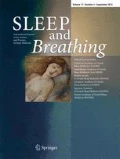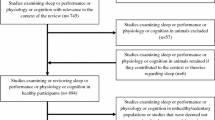Abstract
Background
Sleep deprivation is common among teenagers. The aim of this study was to investigate the relationship between sleep duration, wake/sleep symptoms, and academic performance among Hong Kong students.
Materials and methods
The sleep habit questionnaires were distributed to all Year 11 students at an international school that catered to different ethnic groups in Hong Kong. Analysis of various parameters of academic performance and sleep habits and their relationships were undertaken.
Results
Fifty-nine students were recruited. The average sleep duration in this group was 7.23 h. The overall prevalence of excessive daytime sleepiness (defined as an Epworth Sleepiness Scale score of >10) was 25.4%. Eleven subjects had excessive class sleepiness, defined as high likelihood to fall asleep during at least one school session. Mathematics performance was positively correlated with sleep duration. Excessive sleepiness on rising was identified as a significant risk factor for poor performance in English and Mathematics. Sleepiness during the third and fourth lessons was identified as a significant risk factor for poor performance in Mathematics only.
Conclusion
Sleep deprivation was common in the studied cohort and it was associated with a decrease in Mathematics performance. Excessive sleepiness on rising and sleepiness during third and fourth lessons were associated with poorer grades in Mathematics and English. Excessive daytime sleepiness was reported in 25% of students. Bruxism and snoring were associated with excessive daytime sleepiness.

Similar content being viewed by others
References
Yoo S, Hu P, Gujar N, Jolesz F, Walker MP (2007) A deficit in the ability to form new human memories without sleep. Nat Neurosci 10:385–392. doi:10.1038/nn1851
Walker MP, Stickgold R (2004) Sleep-dependent learning and memory consolidation. Neuron 44:121–133. doi:10.1016/j.neuron.2004.08.031
Curcio G, Ferrara M, Gennaro LD (2006) Sleep loss, learning capacity and academic performance. Sleep Med Rev 10:323–327. doi:10.1016/j.smrv.2005.11.001
Stern WC (1971) Acquisition impairments following rapid eye movement sleep deprivation in rats. Physiol Behav 7:345–352. doi:10.1016/0031-9384(71)90312-X
Smith C (1985) Sleep states and learning: a review of the animal literature. Neurosci Biobehav Rev 9:157–168. doi:10.1016/0149-7634(85)90042-9
Guan Z, Peng X, Fang J (2004) Sleep deprivation impairs spatial memory and decreases extracellular signal-regulated kinase phosphorylation in the hippocampus. Brain Res 1018:38–47. doi:10.1016/j.brainres.2004.05.032
McGrath MJ, Cohen DB (1978) REM sleep facilitation of adaptive waking behaviour: a review of the literature. Psychol Bull 85:24–57. doi:10.1037/0033-2909.85.1.24
Gruart-Masso A, Nadal-Alemany R, Coll-Andreu M et al (1995) Effects of pretraining paradoxical sleep deprivation upon two-way active avoidance. Behav Brain Res 72:181–183. doi:10.1016/0166-4328(96)00082-4
Ng DK, Kwok KL, Cheung JM et al (2005) Prevalence of sleep problems in Hong Kong primary school children. Chest 128:1315–1323. doi:10.1378/chest.128.3.1315
Klackenberg G (1982) Sleep bahaviour studied longitudinally. Data from 4–16 years on duration, night-awakening and bed-sharing. Acta Paediatr Scand 71:501–506. doi:10.1111/j.1651-2227.1982.tb09459.x
Iglowstein I, Jenni OG, Molinari L et al (2003) Sleep duration from infancy to adolescence: reference values and generational trends. Pediatrics 111:302–307. doi:10.1542/peds.111.2.302
Liu X, Uchiyama M, Okawa M et al (2000) Prevalence and correlates of self-reported sleep problems among Chinese adolescents. Sleep 23:27–34
Pilcher JJ, Huffcut AL (1996) Effects of sleep deprivation on performance: meta-analysis. Sleep 19:318–326
Shin C, Kim J, Lee S et al (2003) Sleep habits, excessive daytime sleepiness and school performance in high school students. Psychiatry Clin Neurosci 57:451–453. doi:10.1046/j.1440-1819.2003.01146.x
Johns MW (1991) A new method for measuring daytime sleepiness: the Epworth sleepiness scale. Sleep 14:540–545
Leung SS, Cole TJ, Tse LY et al (1998) Body mass index reference curves for Chinese children. Ann Hum Biol 25:169–174. doi:10.1080/03014469800005542
Steptoe A, Peacey V, Wardle J (2006) Sleep duration and health in young adults. Arch Intern Med 166:1689–1692. doi:10.1001/archinte.166.16.1689
Arakawa M, Taira K, Tanaka H et al (2001) A survey of junior high school students' sleep habit and life style in Okinawa. Psychiatry Clin Neurosci 55:211–212. doi:10.1046/j.1440-1819.2001.00829.x
Gau SF, Soong WT (1995) Sleep problems of junior high school students in Taipei. Sleep 18:667–673
Lazaratou H, Dikeos DG, Anagnostopoulos DC et al (2005) Sleep problems in adolescence. A study of senior high school students in Greece. Eur Child Adolesc Psychiatry 14:237–243. doi:10.1007/s00787-005-0460-0
Kahn A, Van de Merckt C, Rebuffat E et al (1989) Sleep problems in healthy preadolescents. Pediatrics 84:542–546
Wolfson AR, Carskadon MA (1998) Sleep schedules and daytime functioning in adolescents. Child Dev 69:875–887
Carskadon MA, Wolfson AR, Acebo C (1998) Adolescent sleep patterns, circadian timing, and sleepiness at a transition to early school days. Sleep 21:871–881
Epstein R, Chillag N, Lavie P (1998) Starting times of school: effects on daytime functioning of fifth-grade children in Israel. Sleep 21:250–256
Gottlieb DJ, Yao Q, Redline S, Ali T, Mahowald MW (2000) Does snoring predict sleepiness independently of apnea and hypopnea frequency? Am J Respir Crit Care Med 162:1512–1517
Henke KG (1998) Upper airway muscle activity and upper airway resistance in young adults during sleep. J Appl Physiol 84:486–491
Stoohs RA, Dement WC (1993) Snoring and sleep-related breathing abnormality during partial sleep deprivation. N Engl J Med 328:1279. doi:10.1056/NEJM199304293281714
Tsuno N, Jaussent I, Dauvilliers Y et al (2007) Determinants of excessive daytime sleepiness in a French community-dwelling elderly population. J Sleep Res 16:364–371. doi:10.1111/j.1365-2869.2007.00606.x
Ohayon M, Li K, Guilleminault C (2001) Risk factors for sleep bruxism in the general population. Chest 119:53–61. doi:10.1378/chest.119.1.53
Kato T (2004) Sleep bruxism and its relation to obstructive sleep apnea–hypopnea syndrome. Sleep Biol Rhythms 2:1–15. doi:10.1111/j.1479-8425.2003.00077.x
Carskadon MA, Dement WC (1987) Daytime sleepiness: quantification of a behavioral state. Neurosci Biobehav Rev 111:307–317. doi:10.1016/S0149-7634(87)80016-7
Carskadon MA (1990) Patterns of sleep and sleepiness in adolescents. Paediatrician 17:5–12
Dahl RE (1996) The impact of inadequate sleep on children’s daytime cognitive function. Semin Pediatr Neurol 3:44–50. doi:10.1016/S1071-9091(96)80028-3
Gray EK, Watson D (2002) General and specific traits of personality and their relation to sleep and academic performance. J Pers 70:177–206. doi:10.1111/1467-6494.05002
Eliasson A, Eliasson A, King J, Gould B, Eliasson A (2002) Association of sleep and academic performance. Sleep Breath 6:45–48. doi:10.1055/s-2002-23157
Wolfson AR, Carskadon MA (2003) Understanding adolescents’ sleep patterns and school performance: a critical appraisal. Sleep Med Rev 7:491–506. doi:10.1016/S1087-0792(03)90003-7
Author information
Authors and Affiliations
Corresponding author
Appendix
Appendix




Rights and permissions
About this article
Cite this article
Ng, E.P., Ng, D.K. & Chan, C.H. Sleep duration, wake/sleep symptoms, and academic performance in Hong Kong Secondary School Children. Sleep Breath 13, 357–367 (2009). https://doi.org/10.1007/s11325-009-0255-5
Received:
Revised:
Accepted:
Published:
Issue Date:
DOI: https://doi.org/10.1007/s11325-009-0255-5




